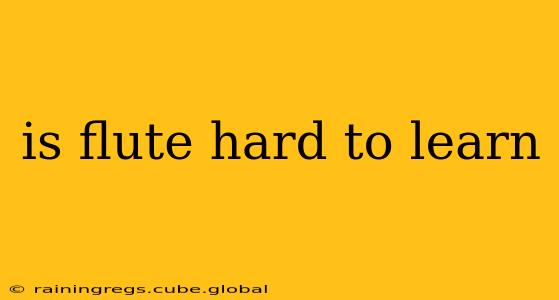The question, "Is flute hard to learn?" doesn't have a simple yes or no answer. The difficulty of learning the flute depends on several factors, including your musical background, natural aptitude, practice habits, and learning resources. While some find it relatively straightforward, others face significant challenges. This guide will explore the complexities of flute learning, addressing common concerns and offering insights for potential flutists.
What Makes Learning the Flute Challenging?
Several aspects of flute playing can present initial difficulties:
-
Embouchure: Developing the correct embouchure (mouth position and airflow) is crucial for producing a clear tone. This requires patience, practice, and often, guidance from a qualified instructor. Incorrect embouchure can lead to frustration and even physical discomfort.
-
Finger Placement and Coordination: The flute's fingering system, while logical, requires precise finger placement and coordination. Initially, this can feel awkward and lead to inconsistent sounds. Mastering complex finger patterns takes time and dedicated practice.
-
Breath Control: Playing the flute requires significant breath control to produce a sustained and consistent tone. Developing good breath support takes time and conscious effort. This is often the most challenging aspect for beginners.
-
Maintaining Consistent Tone Quality: Producing a clear, resonant tone throughout the flute's range requires careful attention to embouchure, breath support, and finger placement. Achieving a consistent tone quality is a skill that develops gradually with practice.
How Hard is it Compared to Other Instruments?
Compared to other wind instruments, the flute's difficulty is often considered to be somewhere in the middle. Instruments like the clarinet or saxophone might present some easier initial challenges due to a more intuitive fingering system in their lower registers. However, the flute’s high register and demanding embouchure requirements can make it equally or even more challenging for some individuals to master. Ultimately, each instrument has unique challenges.
What About Learning as an Adult?
Many adults successfully learn the flute, proving that age is not a barrier. Adult learners often bring greater focus, discipline, and understanding of musical concepts, which can compensate for any lack of prior musical experience. However, adults may also find it more difficult to adjust to the demands of regular practice time.
How Long Does it Take to Learn the Flute?
There's no set timeframe for learning the flute. Progress depends on individual factors, as mentioned earlier. You might be able to play simple melodies within a few weeks of dedicated practice, but mastering complex techniques and developing a polished tone takes years of consistent effort.
Can I Learn the Flute Without a Teacher?
While self-teaching is possible, it's strongly recommended to have a qualified instructor, especially in the beginning. A teacher can provide personalized guidance on embouchure, posture, and other crucial techniques, preventing the development of bad habits that can hinder progress later. They can also offer feedback and motivation.
What are the Benefits of Learning the Flute?
Beyond the joy of music-making, learning the flute offers numerous benefits:
- Improved Lung Capacity and Breath Control: The flute demands controlled breathing, which can improve lung capacity and overall respiratory health.
- Enhanced Coordination and Dexterity: Playing the flute requires precise finger coordination and dexterity.
- Stress Relief and Relaxation: Playing music is a great way to de-stress and relax.
- Cognitive Benefits: Learning the flute can improve memory, focus, and cognitive function.
In conclusion, the difficulty of learning the flute is subjective and depends on many factors. With dedication, practice, and potentially the guidance of a teacher, the rewards of mastering this beautiful instrument are well worth the effort. Don't let the potential challenges discourage you – the journey of learning the flute is a rewarding one.
